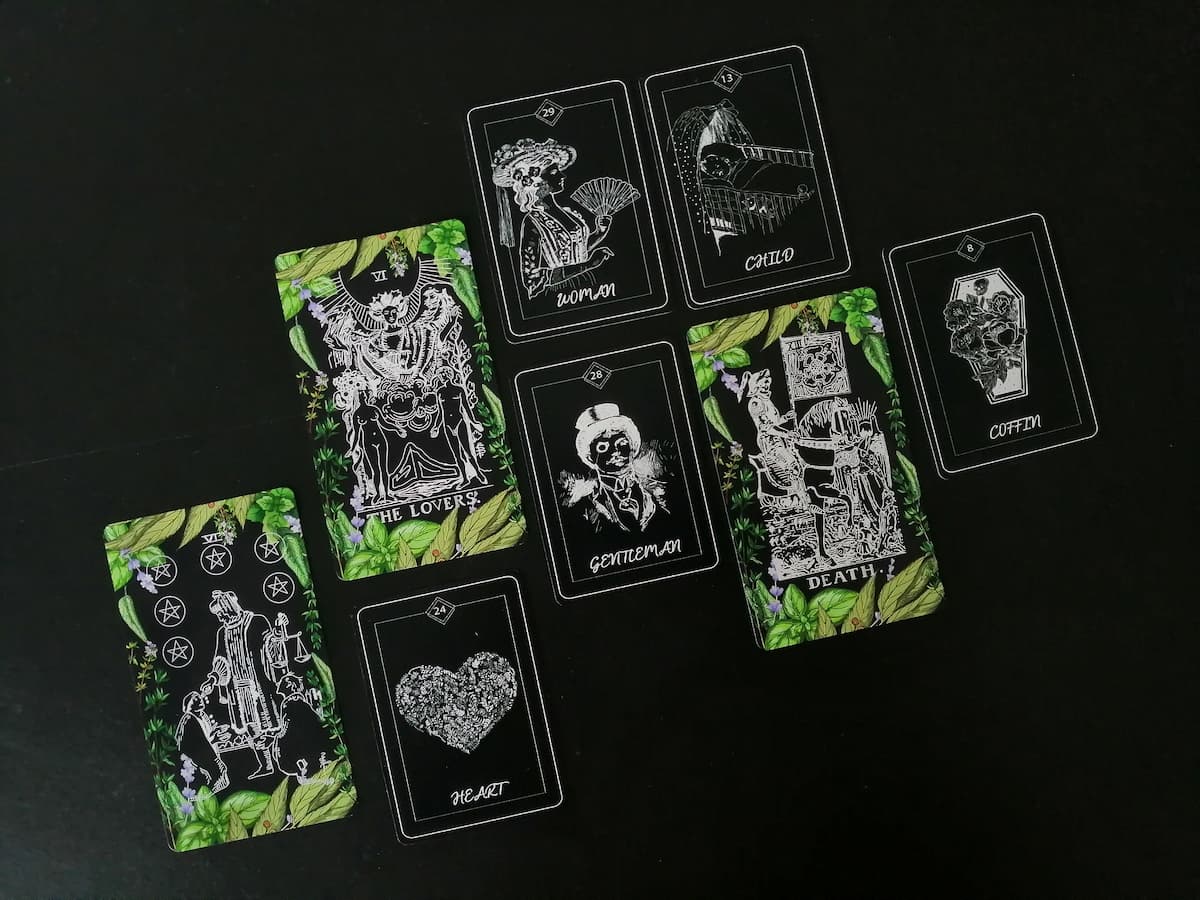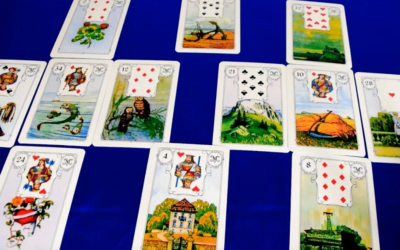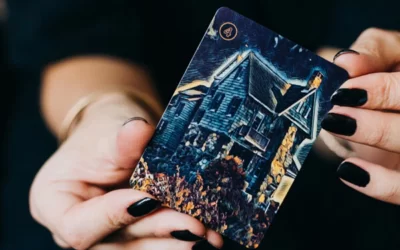Do you want to learn more about Lenormand cards and their equivalents in other divination systems like tarot?
The first thing you should know about Lenormand cards is that they are not Tarot cards. Just like any language, the language of one cartomancy can be translated and aid in learning the other.
In this article, we will explain the Lenormand cards meanings in relation to Tarot. If you want to learn more about these cards, you can also read “How To Read Lenormand Card Combinations?
What Is Lenormand Cards?
We will go through the 36 cards; starting with those that appear similar to Tarot and and explaining them individually but also highlighting how they’re different.
While Lenormand cards are interpreted pairs. Thus, Lenormand card reading shouldn’t be like Tarot reading. Then, what are these 36 Lenormand cards equivalent with Tarot cards?
Lenormand Cards Meanings with Equivalents in Tarot
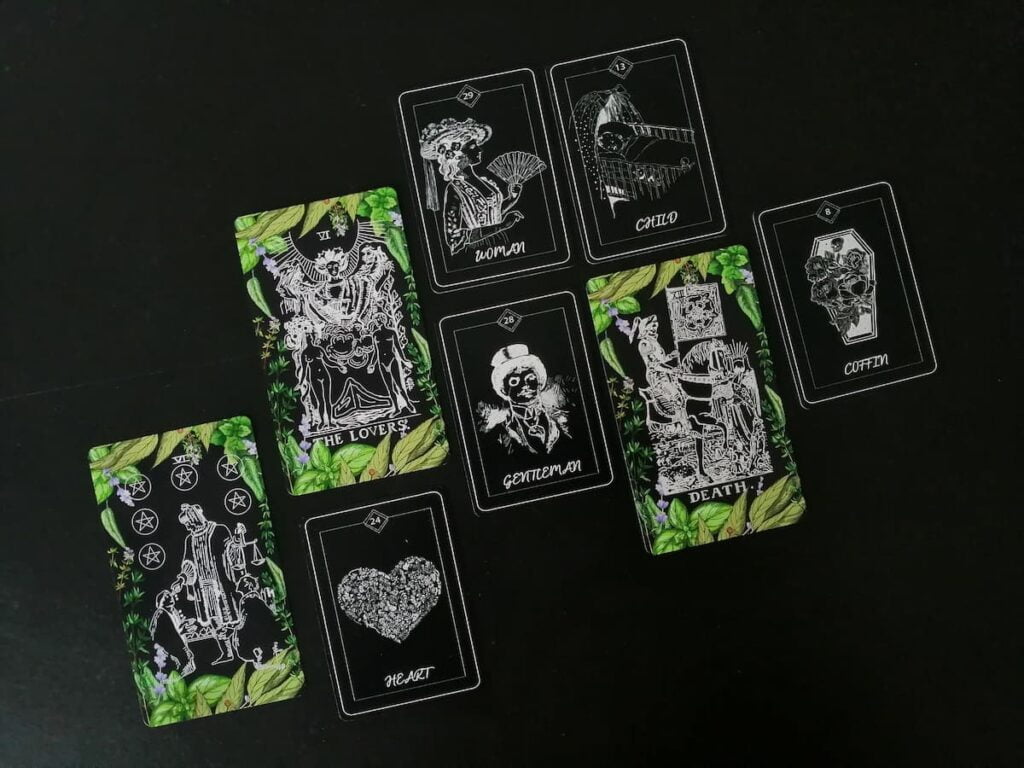
Sun (31) — This Lenormand card is similar to the Sun (19) in Tarot cards in the sense of happiness, joy, warmth. It also talks about success, victory, power, and an overall positive outcome with a strong ‘Yes!’ energy to it. Thing more Wands energy.
Moon (32) — Similar to the Moon (18) Tarot card, this card talks about the subconscious, imagination, intuition and fantasy. However, it also acts as the opposite of the Sun in terms of paranoia, fear, and mood swings. With other Lenormand card combinations, it also generally speaks about emotions of all kind, depending on the card.
Stars (16) — What this and the Star (17) have in common is the topic of dreams, inspiration, hope and progress towards that which you desire. In addition, Stars Lenormand card represent spirituality and faith, as well as the future.
Tower (19) — Differing from the Tower (16) that talks about destruction, this Tower talks about isolation, loneliness and solitude, not unlike a lone Hermit sitting in his tower. Other meaning of this Lenormand card is that of authority and arrogance, someone’s ego sitting on a high spot, like the Reversed Emperor.
Coffin (8) — You might compare this with the Death (13) card in Tarot, but this card is nothing about new beginnings and all about the loss or blocks. This could be losing money, losing health, losing a friend. It also has a general sense of sadness. Alternatively, coffins are berried under ground, symbolizing a blockage or suppression of something, for example suppressing emotions. Whereas in Tarot reverse cards generally mean blockages, here we have a literal blockage card. It’s also comparable to the Ten of Swords as a painful ending.
Scythe (10) — Another Lenormand card that you might confuse with the Death (13) card, but no. This is a card of warning, danger, and suddenness like accidents or fast chain of events. This can mean a decision that wasn’t thought through. Also, the Scythe symbolizes cutting something or someone off, which might also mean you cut something off, like bad habits, for the better.
Heart (24) — You might think of this as the Lovers (6), and it does have keywords of love, reconciliation, forgiveness, and of course romance. It also has a Six of Pentacles energy of charity and giving. Another important keyword is softness.
Man (28) — While in Tarot we think of the Emperor (3) or Mars as the card of masculinity, or use court cards to talk about personalities, the Man or Animus is a single card that represents a man, a person who identifies as more masculine, or masculine energies in general. In combination with other cards, or even with Tarot cards, there’s a lot that can be described about this person.
Woman (29) — Similarly, the Woman, or Anima, is like the Venus or Empress (4) of Tarot in that she represents feminine energies, a female, or a person with a more feminine identity. Interestingly, Man and Woman together typically represent a couple or energetic harmony, but it could also represent, say, a genderfluid individual. Add a Coffin to either cards and we have repressed masculinity or repressed femininity.
Uniquely Lenormand Cards Meanings
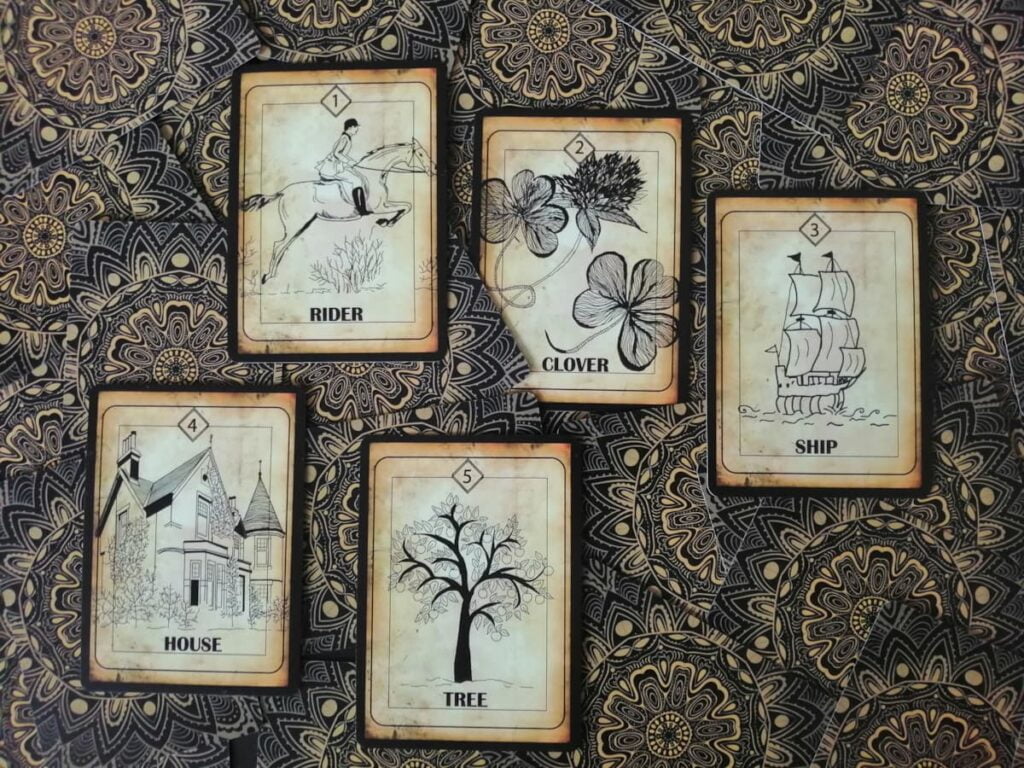
Rider (1) — Depicted as an equestrian, or sometimes as just the horse, the Rider’s keywords are speed, energy, activity, energetical movement and passion. It also represents messages or news. In that sense you might compare it to the Page of Wands. There’s also a theme of coming and going.
Clover (2) — Luck is the biggest keyword for the clover, as well opportunities. It also talks about being happy-go-lucky, as in taking things easily and lightly. There’s a cherishing of the small things in life, and even a dash of humor! You could think of this as the Fool (0) on a regular day when he’s not journeying or leaping into new beginnings; just a regular, casual Fool!
Ship (3) — Denoting travel or distance of any time, we might be talking about an adventure, journey, or about something happening far away from us. In that sense, this Lenormand card comparable to the Three of Wands. Another thing about ships is that they inevitably depart, which symbolizes leaving, moving on, or saying goodbye. In that sense, it’s a bit like the Six of Swords.
House (4) — Symbolizing traditions, customs as well as privacy or conservatism, it’s relatable to the Hierophant. On the other hand, this Lenormand card talks about your home, safety and stability, with a bit of that Ten of Pentacles energy of being comfortable in your domain. When it’s not home, this card can represent any kind of establishment or building in combination with other cards, such as a school, hotel, and more!
Tree (5) — Growth of any kind, especially personal, is a key message of the Tree, a bit like the Seven of Pentacles in that sense. A tree also represents health. Much like the Buddha sitting under the tree, it also talks about spirituality and being grounded, and a little bit like the Hanged Man listens with his head close to the ground. Trees are also connected to the past, like childhood nostalgia, lovers having a picnic, or a buried body.
Clouds (6) — When the weather is cloudy there’s unclarity, confusion, doubt, insecurity. Perhaps even a misunderstanding; like a glass-half-full or -empty situation, are the clouds coming or going? Clouds tend to hide the sky, or hide the world below from the Heavens, so there’s a sense of hidden secrets. You could compare this to the Eight of Swords and Reversed Ace of Swords.
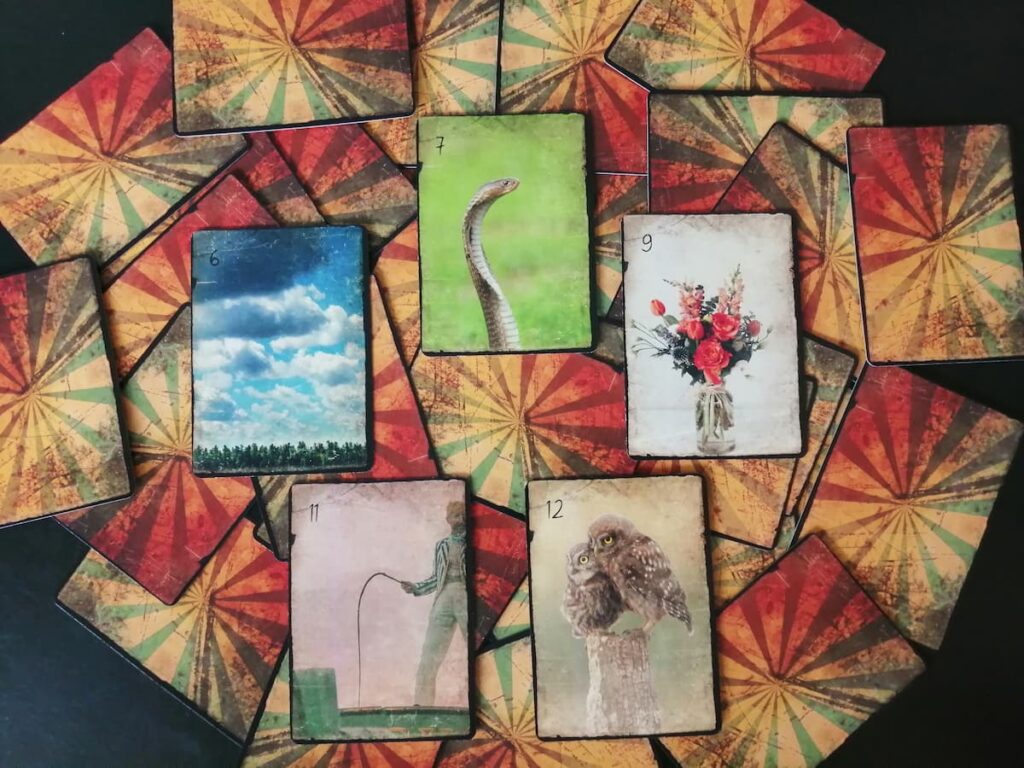
Snake (7) — From a Eurocentric perspective, the Snake Lenormand card represents desire, craving and temptation. In a way it’s like the Devil card when it comes to indulgence. It’s also a card of deception and manipulation. Alternatively, the snake represents secrets and forbidden knowledge, the kind you weren’t meant to find out. Pro tip: if you feel drawn to an alternative association you’re familiar with, eg. the snake represent wisdom, rebirth, medicine or education in other cultures, then go with the one that speaks to you the loudest at this moment!
Bouquet (9) — Think of the bouquet as a socio-cultural tradition. Bouquets represent social life. Some additional keywords include etiquette, compliments, politeness and propriety, and generally giving flowers are a sign of appreciation or empathy. Customs can be used against us, however. In combination Lenormand cards with the Snake, the Bouquet might be a sign of flattery with an agenda; schmoozing. It’s a bit like the Three of Cups in that sense.
Whip (11) — Nothing about the Whip is pleasant. Like Swords in Tarot represent the spoken word and thoughts, the Whip is about rough discussions and debates, especially those that are argumentative, opposing, or in criticism. Whether a positive or negative one, confrontation and conflict between two interests are your main topic when the Whip shows up.

Birds (12) — Think about birds. They’re always chirping and chattering with one another, as is gossiping or worrying about something. While the Whip is about confrontational spoken word, Birds are all about talking of any kind. Birds are also quite jumpy, as if excited or, perhaps, anxious. Alternatively, birds can mean double or ‘two’ of something. Pro tip: your interpretations might also benefit from considering what kind of bird is depicted on your deck’s design!
Child (13) — You might think of the Coffin and the Child Lenormand cards as being two parts of the Death (13) card, one representing endings, and the other new beginnings and inexperience. A Child also represented innocence and playfulness, which is an especially important message for when we get too stressed or busy in our adult lives. Alternatively, we might literally be talking about someone young, kids, or perhaps someone who acts immaturely.
Fox (14 ) — What does the fox say? Whatever it needs to get its way. Foxes are universally associated as cunning and clever, cautious and suspicious tricksters. They’re highly self-centered. In that sense the Fox is like the Seven of Swords. But don’t immediately call the fox selfish! The Fox Lenormand card can also represent self-care and putting yourself first when it’s especially needed. Sometimes we do need to be more fox-like to defend ourselves.
Bear (15 ) — Bears are a highly powerful presence. Strong and kings of their own domain, the Bear is a lot like the Emperor (3) in terms of dominance, leadership, and a bit of a short, bossy temper. Strength can also be used to protect something or someone. Someone powerful might also be someone you look up to for guidance, as bears are popular totem animals and spirit guides.
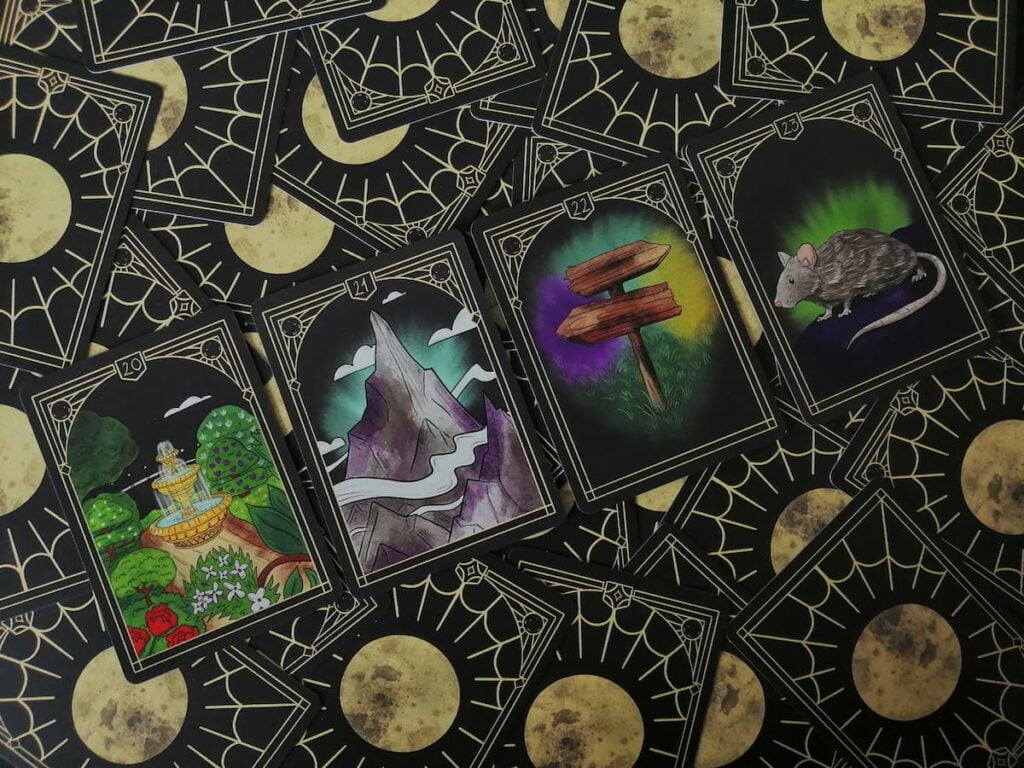
Stork (17 ) — The stork is a migrating bird that symbolizes change, a new cycle as the seasons change and movement. Transformation, a lot like the Magician (1) or that cusp between Death and Rebirth, is the main keyword here. Because migrating birds come and go, it can also symbolize recurring behavior. There’s also a longing for home, or alternatively — freedom! In Lenormand card combination with a couple other cards, Storks are often associated with pregnancy or bringing something to the family nest.
Dog (18 ) — Who’s a man’s best friend? Dogs represent loyalty, support and friendship. Generally the Dog might be talking about a specific friend of yours. On the other hand, this could be obedience and fellowship from a sense of admiration, or perhaps dependence.
Garden (20 ) — Taking one level higher from the Bouquet, the Garden Lenormand card exits you personal social life and goes into your public life. All things involving the public, audience, teamwork or your network of connections has to do with the Garden. We can go even one step higher where the Garden represents fame, being well-known and popular. We might be even talking about society as a whole and cultural norms. Alternatively, public ‘space’ in the twenty-first century also covers online spaces!
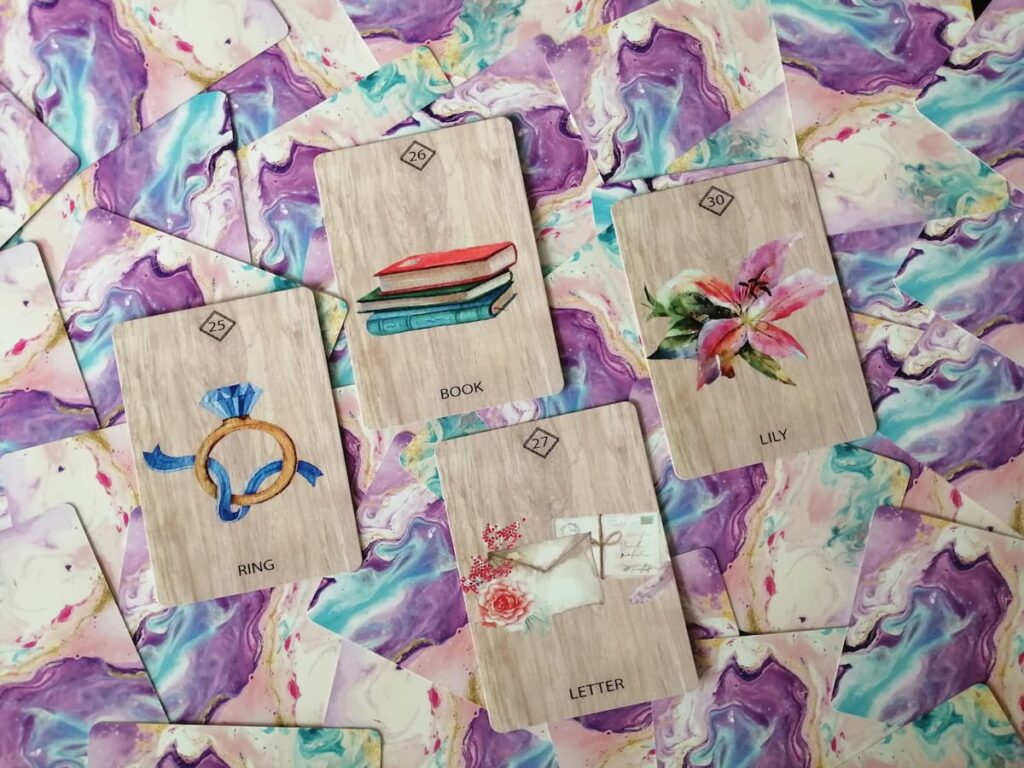
Mountain (21 ) — Challenge is the main keyword here. Mountains on our shoulders or mountains as impenetrable obstacles, they generally represent something that is difficult to obtain, or lots of work to avoid. Nonetheless, though it’s a long way around, it’s not a problem that can’t be climbed or walked around to evade completely. Some things just require extra effort and compromise from your side! Or as the Turkish proverb goes, ‘If the Mountain won’t come to Mohammed, then Mohammed must come to the Mountain.’
Crossroad (22 ) — Choices are often represented as crossroads. You have multiple options and must make a decision, like the Two of Swords in Tarot. But, this Lenormand card also similar to the Two of Swords, a crossroad might be a place of standstill, where you find yourself hesitant to many any decision at all. Alternatively, a crossroad might mean separating or travelling different ways with someone, sometimes for good, and sometimes temporarily to meet again.
Mice (23 ) — In Europe, Mice and rats have had negative associations as carriers of disease. They thus represent illness, destruction, rotting and deficiency. Mice can also represent things that are generally bad or bad for you, like poor habits. And as ‘rats are the first to abandon ship’, Mice, too, could represent a defect in a system, like at work or in a family.
Ring (25 ) — The Ring represents promises and commitments of all kind, be it towards work, a lover, family, studies, or yourself. Rings also represent partnership and cooperation. Think of cults and clubs having matching rings, like you’re part of a team! Of course, long-term romantic relationships are included. The other side of the Ring is being bound to something which is hard to get out of. Alternatively, the Ring has very strong traditional meanings to it, such as honor and nobility.
Book (26 ) — Knowledge, education, research. All that has to do with information is the meaning of the Book. It’s especially tied to studies and learning new skills. A book could also be a diary full of secrets. Alternatively, we might be talking about literal books, such as writing and publishing one. In combination with other Lenormand cards, we might also be referring to hobbies!
Letter (27 ) — Essentially words on paper, the Letter can represent any form of communication, from email to speech. Letters are, more often than not, dialogue between two or more people, thus representing conversations or self-expression. Alternatively, the Letter might be a document, contract or agreement.
Lily (30 ) — Sensuality and sex is in the air. On the other hand, we might be talking morality, ethics and virtues. You might feel that this one is an especially old-fashioned interpretation, but you can associate these things to your culture or modern understanding. The key here is about mental and bodily comfort, whatever that means to you! It also deals with the five physical sense, and all kinds of pleasure, not just physical. The Lily is also a flower of honesty, non-hostile intentions and a kind heart.
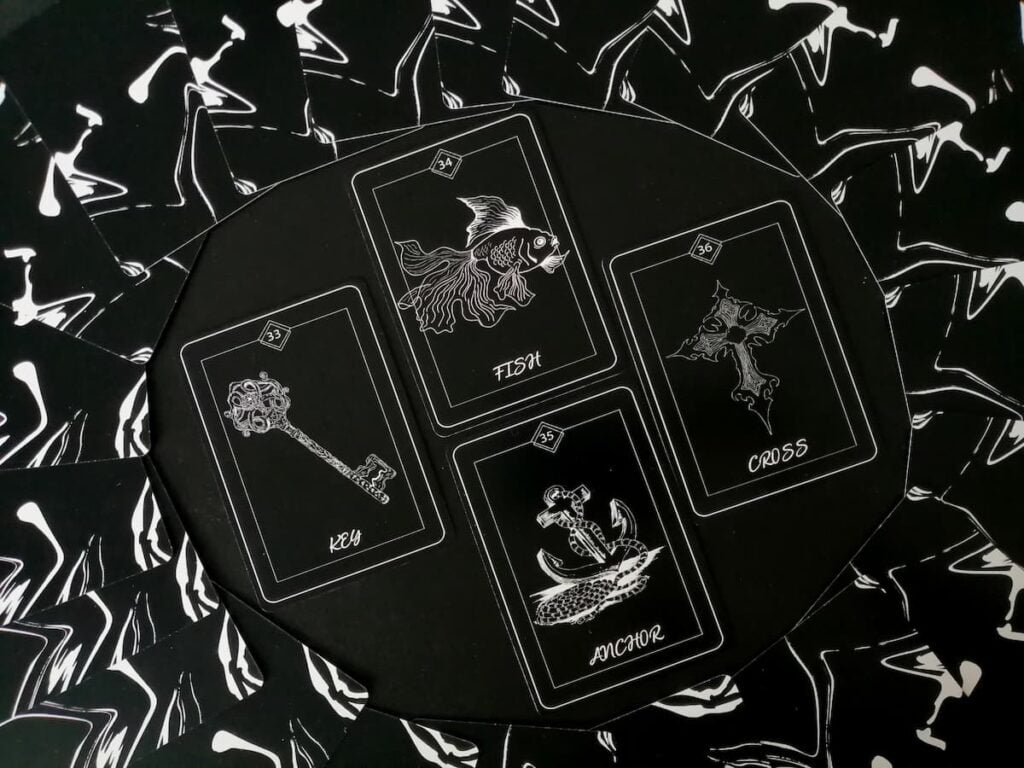
Key (33 ) — It can unlock and it can close. The Key represents revelations, opening up to something, liberating your self. It can also signify resolutions, like when you’re finally ready to put something inside a box, lock it up for good and throw away the key. In that sense, the Key is also recovery and being freed from shackles, or unleashing your full potential.
Fish (34 ) — A very Eastern interpretation of the Fish is abundance. That means finances, business, wealth, and gaining resources of all kind. Abundance can also be internal or spiritual, such as feeling fulfilled. Anything that is valuable to you personally, be it material, emotional or metaphysical, is represented by the fish.
Anchor (35 ) — A very secure card, the Anchor represents stability and securities of all kind. It can speak of a strong foundation or that things are resilient and unbreakable. Some may say the Anchor represents things that hold you back, keep you from moving forward. In that sense, think about the Knight of Pentacles tarot card, upright and reverse. Stability and security can be comforting, or very limiting.
Cross (36 ) — The cross represents burden and our duties. It is the things we should do, even when we don’t want to. Other times unconditional burden isn’t worth it if it isn’t motivated by love, or harms you. The cross also represents your personal beliefs and convictions, not necessarily religious. Whatever it is you stand for, that is your cross.
Final Thoughts About Lenormand Cards
All things considered, with all these equivalences of Lenormand cards in tarot and comparisons, Lenormand spread work in their own unique way. There are more than a thousand combinations to be made with just a pair of cards.
Not only does that cover every Tarot card and its reversal eight times over, but Lenormand spread gives you an even bigger spectrum of situations, places and people to work with. Just a couple of cards can show an extremely detailed and complex situation that would take several Tarot cards to express!
That being said, both Tarot and Lenormand cards have their strengths, which I hope to show with my next week’s post on using Lenormand and Tarot cards together — with free spreads!
You can also read:
